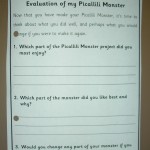Returned to St Margaret’s School, Edinburgh (Monday 8th February 2010) where I spent the day in a Junior (Primary) 2 class (pupils are 6 years old) as part of the work I’m doing for Learning and Teaching Scotland CfE Literacy Team – Real and Relevant – Information and Critical Literacy Skills for the 21st Century Learner’ (Early and First Level). The day was really interesting with the following information literacy activities linked to the Curriculum for Excellence Experience and Outcome HWB 1-30a
By investigating the range of foods available I can discuss how they contribute to a healthy diet.
- Research activity – ‘Facts about our topic’ – working in pairs the children research a topic (fruit, vegetables, bread, dairy products) finding interesting facts about their topic using a selection of books from the school library that the teacher had picked and displayed in her classroom.
One of the pair I observed copied text straight from the books they had selected. It made me think – is this where it starts, the copying of text rather than putting it into your own words. I suppose when you are learning to write you do copy text! As the teacher was busy with another activity / group I decided to ask the girls if they could pick out the words that were important in the text they had written which was about bread making (the topic they had chosen to research was bread). The girls were able to do this and we started to talk about different breads and which ones we liked including French sticks (baguettes) and chapatis (one of the girls mothers mother lived in Dundee and always made then chapatis and Biryani
when they visited so chapatis for this child is associated with Dundee rather than Indian cuisine). As a result of our discussions the girls were able to identify key fats about their topic.
Another pair working on fruit successfully selected their facts without writing / copying whole texts.
- Evaluation Exercise– working in pairs the children had to discuss with their partners and use the evaluation form (see attached photo) to carry out an ‘Evaluation of my Picallili Monster’.
Their Picallili Monster was made out of food chosen by them the previous week as part of a project relating to food. I wish now I had taken a photo of the Picallili Monsters. The pair I observed didn’t work as a pair until they were reminded by the teacher. Whilst one child was more focused and could decide on: 
- what she liked best about the project
- the part of the body she liked best and why
- if she could change her monster would she and why.
The other child was indecisive and even with some questioning from me seemed to choose something randomly resulting in the part she liked best being the part she would change.
As indicated the above exercises worked best when there was an interaction between the children and the teacher or myself with these activities to direct / encourage their thinking. Active learning is a wonderful thing to see in action but a single teacher on her own is not able to interact all the time with all the individual pupils or pairs. It did however make me think that assistance from other practitioners such as school librarians with such learning activities would be greatly appreciated and beneficial.
My thanks to Miss Elizabeth Wood and her class at St Margaret’s School in Edinburgh for allowing me into their world.



